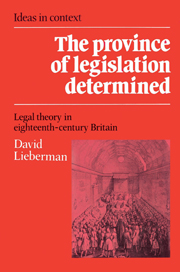9 - Statute consolidation
Published online by Cambridge University Press: 10 October 2009
Summary
The vitality of the eighteenth-century common law courts, as evinced in the expansive rhetoric and practical accomplishments of King's Bench under Mansfield's direction, supplied an impressive support to those like Blackstone who insisted upon the primacy of common law within the English legal system. In the Commentaries, Blackstone had extolled the common law by invoking the wisdom of England's Saxon ancestors, and had sought to reveal the manner in which this ancient structure was disfigured and its foundation threatened by the rash and dangerous enactments of England's untutored legislators. But to seek to protect the common law from such legislative violation was not to reject the opportunity for change and correction within the legal system as a whole. As was most dramatically displayed in the development of the commercial law, the common law system retained the means to adapt and advance English law as altered social circumstance demanded.
On this basis it might appear not only that the common law had on past occasions attained a degree of certainty and level of excellence unmatched in any contemporary legislation, but that in future “the judgments of Westminster Hall” should properly remain the chief “authority” for “by far the greatest part of the law in England.” Indeed, as Kames and Mansfield were quick to point out, past experience and orthodox legal doctrine both confirmed that the law generated through the practice of the courts necessarily surpassed anything that might be achieved by legislation.
- Type
- Chapter
- Information
- The Province of Legislation DeterminedLegal Theory in Eighteenth-Century Britain, pp. 179 - 198Publisher: Cambridge University PressPrint publication year: 1989
- 1
- Cited by



